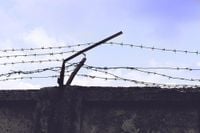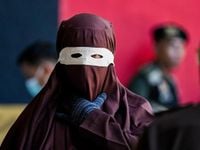On August 26, 2025, the city park of Banda Aceh in Indonesia’s Aceh province became the stage for a controversial spectacle: two young men, aged 20 and 21, were publicly flogged after being convicted of same-sex relations under Aceh’s Islamic criminal law. The punishment—76 lashes each, delivered by masked members of the Sharia police—was witnessed by a crowd of around 100 people, some of whom recorded the event on their phones, capturing the men’s visible pain and distress as they grimaced and, at one point, burst into tears.
The case, reported by multiple outlets including The Advocate, Daily Mail, and ABS-CBN, has reignited debate about Aceh’s unique legal status in Indonesia and the clash between local customs and international human rights standards. Aceh is the only province in the world’s largest Muslim-majority country where Sharia law is enforced, a concession granted by the national government in 2001 to quell a long-running separatist insurgency. Since 2015, Aceh’s qanun jinayat bylaws have criminalized not just same-sex relations, but also adultery, gambling, and alcohol consumption, with punishments that can include up to 200 lashes.
The two men’s ordeal began in April 2025, when a member of the public reported suspicious activity in a public park bathroom. According to court records cited by CBS News and Daily Mail, local Sharia police responded and found the pair hugging and kissing—actions the court ruled as sexual acts leading to banned sexual relations. The men had reportedly met through an online dating app, a detail that underscores the risks LGBTQ+ individuals face in a province where even private, consensual intimacy can lead to harsh penalties.
Initially sentenced to 80 lashes each, the men’s punishment was reduced by four for time spent in detention. They were not alone on the stage: eight others, including three women and five men, were also flogged that day for offenses such as adultery, premarital sex, and online gambling. As Daily Mail described, the convicted were lashed across their backs with rattan sticks, only allowed brief breaks every 20 minutes for water and wound treatment. After the final lash, one of the men had to be carried away, unable to move from the pain.
Public caning is not new to Aceh. Since the province implemented Islamic law in 2015, there have been at least five verdicts involving homosexuality. Earlier in February 2025, two other men, aged 24 and 18, were publicly flogged in the same park after being convicted of same-sex acts. These punishments are meted out for a range of so-called morality offenses, including women wearing tight clothes, men not attending Friday prayers, gambling, and drinking alcohol. Aceh’s bylaws even extend to non-Muslims, who make up about 1% of the population.
The spectacle of public caning has drawn repeated condemnation from human rights organizations. On the day of the latest flogging, Amnesty International’s Regional Research Director Montse Ferrer issued a statement calling the punishment “a disturbing act of state-sanctioned discrimination and cruelty.” Ferrer continued, “This punishment is a horrifying reminder of the institutionalized stigma and abuse faced by LGBTQ+ individuals in Aceh. Intimate relationships between consenting adults should never be criminalized.” Amnesty has repeatedly called on Indonesia to repeal laws permitting corporal punishment, arguing they violate international treaties the country has ratified, such as the International Covenant on Civil and Political Rights and the UN Convention Against Torture.
Despite this international outcry, local support for caning remains robust. As reported by CBS News, Acehnese resident Aulia Saputra, who attended the caning, said, “I hope that with the implementation of this caning punishment, it can serve as a lesson for the offender and also create a deterrent effect, so that such incidents do not happen again in the future.” This sentiment reflects a broader belief among many in Aceh that Sharia law is essential to maintaining public morality and upholding Islamic values.
The central government in Jakarta has historically deferred to Aceh’s autonomy, even as it faces mounting pressure from rights groups and international bodies. Indonesia’s national criminal code does not criminalize homosexuality, but it cannot override Aceh’s regional Sharia laws. In 2016, a coalition of human rights organizations petitioned the Indonesian Supreme Court to review Aceh’s caning regulations, but the request was rejected. The Ministry of Home Affairs did issue a letter to Aceh’s governor the same year, noting that regional laws should only be used for minor crimes, but the province’s Sharia system has remained largely untouched.
Critics say this hands-off approach undermines Indonesia’s constitutional commitment to equality and non-discrimination. Maidina Rahmawati, acting executive director of the Institute for Criminal Justice Reform in Indonesia, told CBS News that public caning “is contrary to various laws and regulations and also contrary to human rights interests in Indonesia because its exposure is not good for Indonesia.” Rahmawati added that the implementation of Sharia-based policies in Aceh has been shaped by shifting political dynamics and the desire to support a distinct local government identity.
The events of August 26, 2025, have again highlighted the deep tension between Indonesia’s decentralized legal system and its international human rights commitments. While Aceh’s authorities argue that the qanun jinayat reflects the province’s customs and religious convictions, international organizations and many Indonesians outside Aceh see public caning—especially for consensual same-sex relations—as a violation of basic human dignity.
For now, the men who endured the lashes in Banda Aceh join a growing list of individuals punished under a system that, while rooted in local autonomy, continues to draw sharp criticism from the wider world. Their story serves as a stark reminder of the challenges faced by LGBTQ+ people in Aceh, and of the ongoing struggle over the boundaries between tradition, law, and universal human rights.



